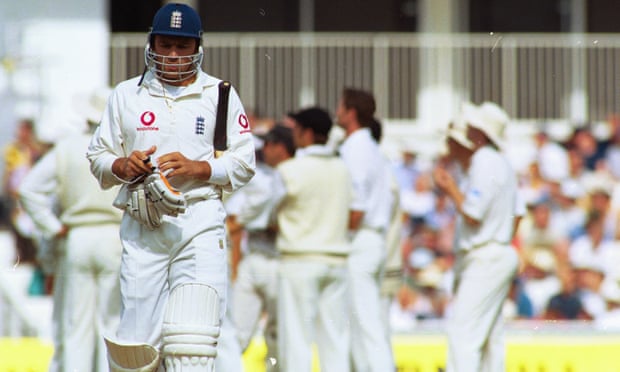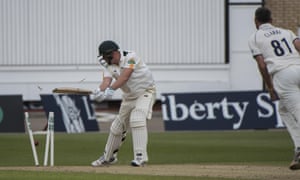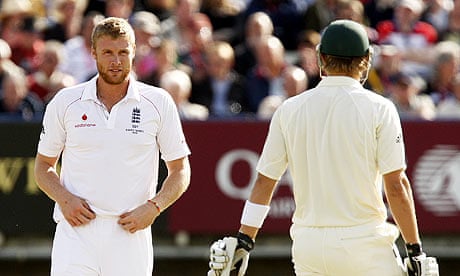when you have the proper access codes, I’d advocate looking at the very fun Sky sports activities documentary England in the 90s. Supplied via the waspish and witty Mark Butcher, the movie guarantees to raise the lid on “that iconic decade,” digging up the skeletons and marching them around, tooth chattering, papery skin still flapping, and commonly finding out how an England crew filled with talent became the scowling guy-boobed whipping boys of global cricket.
Not that England inside the 90s does any of this in absolutely startling detail. A few years back, talking approximately the “golden age” of Radio 1, John Peel dropped in a devastating story about a drunken BBC Christmas birthday party in which Peel and David “child” Jensen had lain in wait inside the vehicle park with the sole goal of thrashing up Simon Bates. Well, there’s no longer actually whatever like that here.

This is not a scalding evisceration. Departed selectors aside, the only person who gets mildly singed is Graham Gooch, who, as you could have already accrued, liked each person to do a chunk of running. Gooch doesn’t work for Sky. He is taking it well.
It’s miles more a gently questing in-house process with masses of first-rate, coronary heart-rending, trauma-triggering footage, lots of it offering baffled, tired searching guys slumped behind press-room desks or unhappy figures in pre-modern pads and arm guards trudging off, stumps splayed, even as men in inexperienced hats shout at them.
No longer than the movie suffers as a result, that is a gripping tale, but you slice it. even if it’s being advised thru a honeyed glaze, with Sky itself constantly destined to come to be the actual hero, the steadiness of tv-funded important contracts a herbal counterpoint to all that chaos. The equipment exchange duly arrives halfway through as production values ramp up, and unexpectedly, the players are dressing in branded tracksuits and prototype crew England tools.

And why now not? There has been obvious progress. Sky’s coverage is thrillingly exact. England in the 2010s is a far greater success system. This week a totally likable, frisky, exciting test team have kicked off a well-stocked test match summer season in Leeds. The lot’s excellent. Better. Exceptional. Exceptional.
But what do I experience now? Doubt? As Philip Larkin mentioned, the group is younger within the M1 cafe. The youngsters are screaming for more, however, no longer, apparently, for more, take a look at cricket. There had been nine,346 within the stands at Headingley for the first day of the test, nearly 2,000 down at the identical day towards the same opponents two years ago.
Read More Articles :
- Should Australians Still Invest Properties in the United States?
- Start a Home Travel Business and Profit From the Multi-Billion Dollar Online Travel Industry
- Chandigarh-based totally Johar brothers force customised answers for computer systems and gaming.
- Improving the Sustainability of Development Finance
- 5 Reasons Why Investing in Property in Hull Will Create Wealth
Possibly the most giant part of England within the 90s is what it tells you between the strains. This is a great news story that contains a powerful undertow, chiefly in the startling reminder that our own nicely-tended minor game changed into till very these days a proper national obsession.
The Butcher document comes rapidly after Emma John’s memoir of 90s cricket obsession, Following On, which includes a comparable vanished sense of scale and weep. The lot mattered then. I bear in mind a newspaper front web page concentrated around a huge cut-up-display screen p.c of a wonky England bat with an “X” slashed across the front, juxtaposed with a directly Australian one. Wonky bats on the front web page. Wild, swirling headline fears about decline and disintegration, ambition and tension. Cricket turned into just like the Brexit debate.

In addition, the gamers themselves – fall men, burnouts, a punchline to the new dawn – were nonetheless outsize figures. Graeme Hick might also have done not explicit the full would possibly of his batting talent; however, even now he remains a highly mighty, mournful, Kong-like determine, for all time wandering off as his stumps explode behind him, manacles dragging, menaced by means of helicopters, tiny twig-like bat tucked under his arm.
No person ever appeared to be clearly gambling, as a substitute playing the sport inside the game within the game, strangulation of personal ambition and wider tidal forces. Mark Ramprakash still looks so furious, so lost inside the second you half expect to appearance down and be aware he’s by chance gnawed off one among his legs between overs. The bowlers are a joy too, gamers with homemade, defiantly un-homogenised actions, all oddly-angled run-America, and sweeps of the arm. Devon Malcolm ran in like a heavy goods’ car triumphantly veering off a mountain skip. Allan Mullally’s run-up didn’t seem to be something to do with sport at all, resembling instead a person going for walks alongside the beach or approximately to catch a Frisbee.
Yet, preposterously perhaps, they were nonetheless country-wide figures. There was a truthful threat your common man in the street knew who John Embury was. Mike Gatting could deliver a tabloid front page. Contrast this with the latest tv advertisements that had England’s largest stars – Joe Root, Jonny Bairstow – turning as much as supply humans’ shopping. High-quality idea … except, the most commonplace reaction amongst the majority of the populace is possibly to be something along the lines of, oh, a few satisfactory, athletic-looking ginger bloke’s handing over my shopping. Why’s he grins at me? Have I tipped him?
This is not supposed as a sour-faced middle-elderly anti-neoliberal economics complaint. We recognise all this already. The ECB and the counties are aware of the need to “attain out.” Nor is this the instant to begin firing up the unfastened-to-air television debate, now pointlessly polarised (answer: a chunk is probably exact). Or to live on the bigger issue, one who lies past cricket, of the disappearance of the sport from faculties, the dieback of golf equipment and pitches, particularly in city regions.

The factor is, there’s still desire. All that passion, the visceral pull of England inside the 90s, continues to be there, albeit in focused shape. The coverage of the sport, so nicely proper to the net, has never been so various and so complete of power. The T20 Blast will sell out this summer. County cricket, and the colt’s ranges stretching down into college and age companies, is filled with talented younger gamers.
The query is, who will watch them? What sort of sport are they going to play? Headingley kicks off fifty-one days of Britain cricket this summer season, 22 of with a view to being overshadowed by means of a few larger wearing occasions someplace else. For English cricket, the actual enemy isn’t emerging markets or the obsession with a lack of repute to India. It’s miles as an alternative easy home irrelevance, the annihilating pull of soccer, no person giving a rattling in 10 years’ time.
It changed into heartening to hear Colin Graves, the ECB chairman, speaking with absolute, even tactless reality – sure Sky, the T20 Blast we offered you for £65m is “mediocre” – about the need to pluck out a model of the game that could make this painting once more in England. And perhaps keep away from the lurking prospect that the simplest movie absolutely everyone’s going to make about England inside the 2010s is a type of thriller tale, a whodunnit, a tale of disappearance and decline to be enjoyed in an ever-shrinking circle of privateness.








